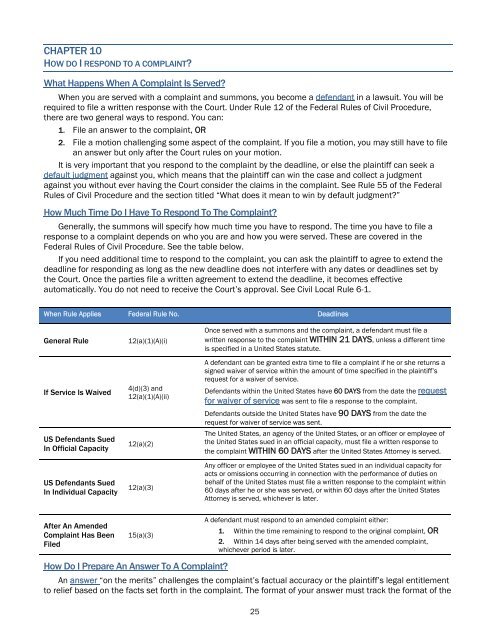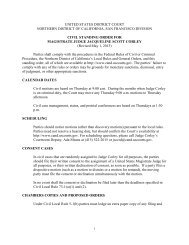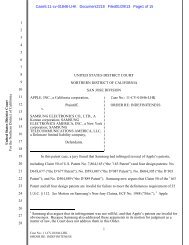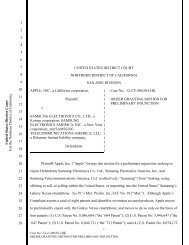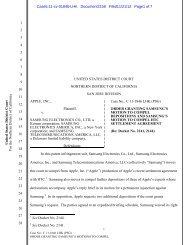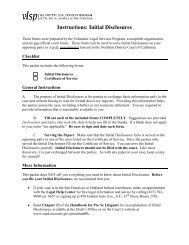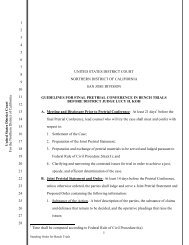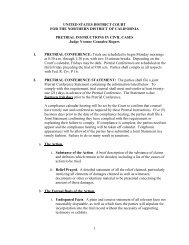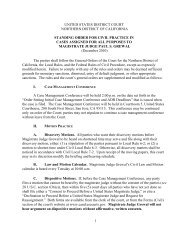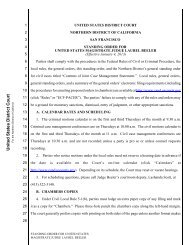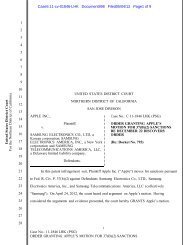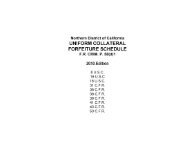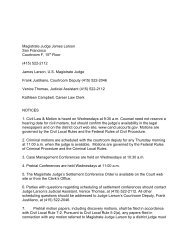Representing Yourself in Federal Court - United States District Court ...
Representing Yourself in Federal Court - United States District Court ...
Representing Yourself in Federal Court - United States District Court ...
You also want an ePaper? Increase the reach of your titles
YUMPU automatically turns print PDFs into web optimized ePapers that Google loves.
CHAPTER 10<br />
HOW DO I RESPOND TO A COMPLAINT?<br />
What Happens When A Compla<strong>in</strong>t Is Served?<br />
When you are served with a compla<strong>in</strong>t and summons, you become a defendant <strong>in</strong> a lawsuit. You will be<br />
required to file a written response with the <strong>Court</strong>. Under Rule 12 of the <strong>Federal</strong> Rules of Civil Procedure,<br />
there are two general ways to respond. You can:<br />
1. File an answer to the compla<strong>in</strong>t, OR<br />
2. File a motion challeng<strong>in</strong>g some aspect of the compla<strong>in</strong>t. If you file a motion, you may still have to file<br />
an answer but only after the <strong>Court</strong> rules on your motion.<br />
It is very important that you respond to the compla<strong>in</strong>t by the deadl<strong>in</strong>e, or else the pla<strong>in</strong>tiff can seek a<br />
default judgment aga<strong>in</strong>st you, which means that the pla<strong>in</strong>tiff can w<strong>in</strong> the case and collect a judgment<br />
aga<strong>in</strong>st you without ever hav<strong>in</strong>g the <strong>Court</strong> consider the claims <strong>in</strong> the compla<strong>in</strong>t. See Rule 55 of the <strong>Federal</strong><br />
Rules of Civil Procedure and the section titled “What does it mean to w<strong>in</strong> by default judgment?”<br />
How Much Time Do I Have To Respond To The Compla<strong>in</strong>t?<br />
Generally, the summons will specify how much time you have to respond. The time you have to file a<br />
response to a compla<strong>in</strong>t depends on who you are and how you were served. These are covered <strong>in</strong> the<br />
<strong>Federal</strong> Rules of Civil Procedure. See the table below.<br />
If you need additional time to respond to the compla<strong>in</strong>t, you can ask the pla<strong>in</strong>tiff to agree to extend the<br />
deadl<strong>in</strong>e for respond<strong>in</strong>g as long as the new deadl<strong>in</strong>e does not <strong>in</strong>terfere with any dates or deadl<strong>in</strong>es set by<br />
the <strong>Court</strong>. Once the parties file a written agreement to extend the deadl<strong>in</strong>e, it becomes effective<br />
automatically. You do not need to receive the <strong>Court</strong>’s approval. See Civil Local Rule 6-1.<br />
When Rule Applies <strong>Federal</strong> Rule No. Deadl<strong>in</strong>es<br />
General Rule 12(a)(1)(A)(i)<br />
If Service Is Waived<br />
US Defendants Sued<br />
In Official Capacity<br />
US Defendants Sued<br />
In Individual Capacity<br />
After An Amended<br />
Compla<strong>in</strong>t Has Been<br />
Filed<br />
4(d)(3) and<br />
12(a)(1)(A)(ii)<br />
12(a)(2)<br />
12(a)(3)<br />
15(a)(3)<br />
How Do I Prepare An Answer To A Compla<strong>in</strong>t?<br />
Once served with a summons and the compla<strong>in</strong>t, a defendant must file a<br />
written response to the compla<strong>in</strong>t WITHIN 21 DAYS, unless a different time<br />
is specified <strong>in</strong> a <strong>United</strong> <strong>States</strong> statute.<br />
A defendant can be granted extra time to file a compla<strong>in</strong>t if he or she returns a<br />
signed waiver of service with<strong>in</strong> the amount of time specified <strong>in</strong> the pla<strong>in</strong>tiff’s<br />
request for a waiver of service.<br />
Defendants with<strong>in</strong> the <strong>United</strong> <strong>States</strong> have 60 DAYS from the date the request<br />
for waiver of service was sent to file a response to the compla<strong>in</strong>t.<br />
Defendants outside the <strong>United</strong> <strong>States</strong> have 90 DAYS from the date the<br />
request for waiver of service was sent.<br />
The <strong>United</strong> <strong>States</strong>, an agency of the <strong>United</strong> <strong>States</strong>, or an officer or employee of<br />
the <strong>United</strong> <strong>States</strong> sued <strong>in</strong> an official capacity, must file a written response to<br />
the compla<strong>in</strong>t WITHIN 60 DAYS after the <strong>United</strong> <strong>States</strong> Attorney is served.<br />
Any officer or employee of the <strong>United</strong> <strong>States</strong> sued <strong>in</strong> an <strong>in</strong>dividual capacity for<br />
acts or omissions occurr<strong>in</strong>g <strong>in</strong> connection with the performance of duties on<br />
behalf of the <strong>United</strong> <strong>States</strong> must file a written response to the compla<strong>in</strong>t with<strong>in</strong><br />
60 days after he or she was served, or with<strong>in</strong> 60 days after the <strong>United</strong> <strong>States</strong><br />
Attorney is served, whichever is later.<br />
A defendant must respond to an amended compla<strong>in</strong>t either:<br />
1. With<strong>in</strong> the time rema<strong>in</strong><strong>in</strong>g to respond to the orig<strong>in</strong>al compla<strong>in</strong>t, OR<br />
2. With<strong>in</strong> 14 days after be<strong>in</strong>g served with the amended compla<strong>in</strong>t,<br />
whichever period is later.<br />
An answer “on the merits” challenges the compla<strong>in</strong>t’s factual accuracy or the pla<strong>in</strong>tiff’s legal entitlement<br />
to relief based on the facts set forth <strong>in</strong> the compla<strong>in</strong>t. The format of your answer must track the format of the<br />
25


